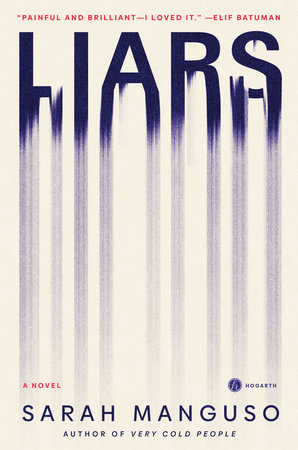If Sarah Manguso’s new novel, Liars, can be categorized in any genre, it is probably best characterized as a horror story. It tells the intimate, blistering story of a marriage that seemingly begins as a fulfilling partnership between John and Jane, who ostensibly share artistic aspirations and mutual ambitions, but quickly devolves into a relationship defined by unequal domestic workloads, misogynistic resentment, and psychological manipulation.
The novel’s evocative depictions of gaslighting and sexism will demoralize you. That John repeatedly manages to gaslight Jane into believing she is crazy and that all of their marital problems can be traced back to her will make your skin crawl. But the book’s most disturbing element is how it incisively and completely captures a truth about the structure of marriage that many of us know but would prefer not to confront.
Written with cutting prose and sharp wit, Liars explores creative ambition, motherhood, and gendered rage. It’s an essential addition to the canon of women writers illustrating the truth behind that old feminist proverb: the personal is political.
I spoke with Manguso over email about being radicalized by divorce, listening to our mothers, and the delusion behind women shrinking themselves to appease patriarchy.
Marisa Wright: In an interview from 2015, you said, “It was a failure of my imagination that I couldn’t conceive of motherhood as anything but a surrender to the patriarchy.” Does this book—and how it grapples with this idea—reflect that prior view or something new you’ve come to understand?
Sarah Manguso: In that 2015 interview I was marveling about a lesson that, despite its obviousness, I’d only recently learned, which is that children are interesting. Now, almost a decade later, I’m marveling again about another obvious lesson that I learned too late, which is that a ton of apparently progressive men absolutely love patriarchy.
MW: If I understand your answer correctly, you realized there is merit to motherhood independent of the patriarchy, but that’s not necessarily so for heterosexual marriage (or if it is, it’s to a much lesser and more complicated extent). Is that an accurate description of what you came to realize, and by extension, what’s depicted in Liars?
Traditional marriage is a patriarchal tool used to control and dehumanize women.
SM: Yes, that’s apt. Traditional marriage is a patriarchal tool used to control and dehumanize women. Motherhood, on the other hand, doesn’t need patriarchy, which is why conservatives so doggedly work to convince us that it’s trivial and that mothers shouldn’t need any resources, beyond our own bodies, to survive it.
MW: Amongst other recently published books that involve divorce, your book stands out for capturing the depths of cruelty and inequality that can exist in a marriage. And while you write with incredible specificity, many of the narrator’s experiences are very recognizable to anyone who has observed or experienced psychological abuse. When you decided to write this novel, how conscious were you of how ubiquitous these experiences are?
SM: Covid exposed the fact that, to quote Jessica Calarco, women are America’s social safety net. I felt buoyed by an ocean of female rage while I was writing Liars. That ocean, that fellowship of rage, is what held me up.
You mention the incredible specificity of Jane’s account; it was important to me to build a critical mass of concrete details. Jane’s taking things day by day, detail by detail, under the burden of bromides like Marriage takes work. She’s making a good faith attempt to be a partner, to be a wife, to compromise, to sacrifice. She’s living it in real time, though. The reader knows long before Jane does that she is being abused.
MW: The marriage depicted in this book is shaped by internal forces (e.g., John’s resentment of the narrator’s professional success) and structural forces (e.g., the devaluation of writing, which means Jane earns much less than John, making her financially vulnerable). What’s the relationship between the external and internal forces that contribute to the end of Jane and John’s marriage?
SM: Jane is confused for a long time about what she senses, but does not truly recognize, as John’s resentment of her success. After all, he’s mirroring her progressive values while also somehow sabotaging her career and her ability to work. She really, really wants a supportive partner, and like many women, she’s incredibly skilled at projecting that wish onto her husband. She’s ashamed to have married a man like him, and her solution is simply to pretend that everything’s fine. After all, she knows that the entire culture is ready to blame her for “choosing” to be abused.
MW: There are moments when Jane sort of takes responsibility for contributing to their unequal dynamic by putting up with various things or letting them go because it’s more convenient. It seems possible there is some truth to this feeling, but it’s complicated by how John constantly faults her for their marital issues, even by weaponizing her mental illness, which seemingly causes Jane to internalize this blame. Is there a way to reconcile these two facts?
Women of my generation were sold a bill of goods for a new kind of progressive heterosexual partnership that, for most of us, never actually materialized.
SM: Like many abuse victims, Jane believes that she can fix her marriage by becoming smaller; that if she were a more subservient wife, John wouldn’t abuse her. Jane’s psychiatric hospitalization, which took place years before she and John even met, makes her an excellent victim—John can torture her to the point of breakdown, and if anyone raises concern, he can just dredge up that long-ago hospitalization and blame her “mental illness.”
MW: At various points, Jane laments being unaware of how becoming a wife and mother would take over her life and displace her identity. Is there anything instructive about what Jane comes to understand about the implications of marriage and motherhood on women’s lives?
SM: Jane thinks her mother’s an embarrassing anachronism; she hoards jewelry, calls herself a housewife, and openly assumes that all men drink and gamble. Jane’s mother tells Jane that John wouldn’t travel so much unless he was cheating on her. Jane wishes that she’d listened to her mother. Listen to your mother? I guess that’s the instruction.
MW: Relatedly, there’s a striking moment when Jane writes to her friend Hannah, “Even a decent marriage drains the life out of a woman.” Can you expand on the roots of this sentiment in the narrative?
SM: I believe that traditional marriage is a domestic abuse paradigm, and that in our culture, all marriages skew traditional unless you and your spouse are doing a superhuman amount of work to correct for the misogyny that’s baked into every social, political, professional, educational, legal, financial, and medical system.
MW: Even outside of John’s abusive behavior, Jane is constantly faced with the tension between her writing career and being a mother, which is a persistent theme for many women writers. What did you want to add to this ongoing conversation with Jane’s story?
My divorce radicalized me, and Liars is my first expression of that new perspective.
SM: Being a writer and being a mother are not absolutely incompatible. What we’re really talking about, in that conversation, is money, not motherhood. And I’ve lost track of the number of women I’ve heard say that being a single mother with scant resources is a thousand times easier than being married to a worse-than-useless man. To put a finer point on it: Wifehood, not motherhood, is what really fucks us. Women of my generation were sold a bill of goods for a new kind of progressive heterosexual partnership that, for most of us, never actually materialized.
MW: Your previous books have explored deeply painful or distressing experiences, but Liars feels like it reaches a whole new level in that respect. Did the experience of writing this book feel different than your previous works?
SM: While writing this book, I was undergoing an extremely rapid education. My divorce radicalized me, and Liars is my first expression of that new perspective.
MW: You have included elements of your own life in your previous books, which I’m sure leads readers to feel permission to ask very personal and intrusive questions. In an ideal world where they don’t have to think about the repercussions, how would you like to see writers respond to these kinds of questions?
SM: We’re all doing the best we can in a world that is, as you point out, not ideal. I’m not here to disapprove of other writers’ degrees of disclosure.
Over the years, attitudes seem to have changed drastically about what a writer, especially a woman writer, ought to disclose. Decades before social media, women were openly despised for acknowledging that we had bodies, that we weren’t just disembodied minds. Now, decades later, it seems that when we aren’t constantly online, fawning and sharing pictures of ourselves, we’re despised for being uppity and cold. I’m old and ornery enough to have drawn fire from both sides, decades apart. Ho-hum. I will continue to write books as long as I am able, and in the future, when there’s a whole new reason to hate women, I hope I’ll still be around to face it down.
Take a break from the news
We publish your favorite authors—even the ones you haven’t read yet. Get new fiction, essays, and poetry delivered to your inbox.
YOUR INBOX IS LIT
Enjoy strange, diverting work from The Commuter on Mondays, absorbing fiction from Recommended Reading on Wednesdays, and a roundup of our best work of the week on Fridays. Personalize your subscription preferences here.

